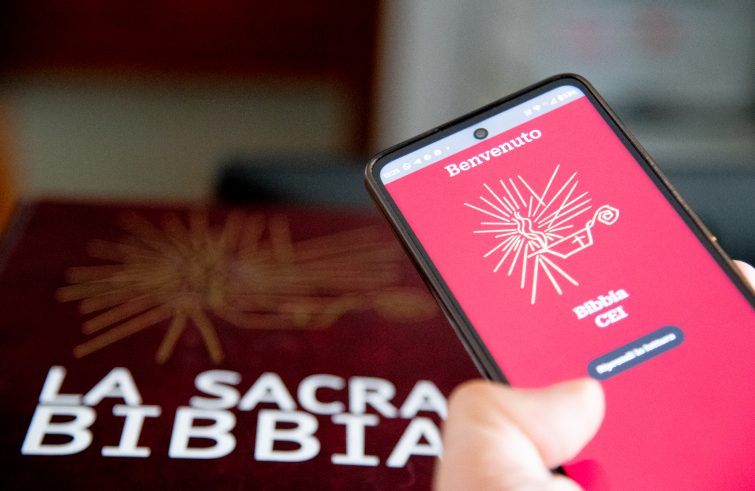
“Each of our initiatives, connected with communication, is invariably permeated by the lifeblood of proclamation and evangelisation. If not, its peculiarity would be lost. Technology can thus serve the purpose of proclamation.” Vincenzo Corrado, director of the National Office for Social Communications of the Italian Bishops’ Conference, presented the new App “Bibbia CEI” (Bible of the Italian Bishops’ Conference): a tool for consulting the Holy Scriptures designed for newest generation devices, available on Apple Store and Google Play.

Technology at the service of Gospel proclamation?
The commitment to the spread of the Word in the digital realm is one of the many possibilities that clearly involve the skilful use of new technologies. The experience of the BibbiaEdu.it website, which dates back to 2000, makes it possible to “meet and navigate” the 2008 version of the CEI Bible, which has evolved into the CEI Bible App, now completely renewed.
What are its main new features?
The App offers all the services of the website www.bibbiaedu.it, allowing users to access the translation of the 2008 official CEI Bible and compare it with other official texts in Italian, Hebrew and Greek.
Unlike previous versions, it can also be used offline.
It can be accessed from the most up-to-date devices and allows for the adjustment of contrast and font size for the visually impaired. The App and the website BibbiaEdu.it feature the texts of the official Bible of the Italian Bishops’ Conference (2008 and 1974), the Interdenominational Bible, the Old Testament in Hebrew and Greek, the New Testament in Greek and the Nova Vulgata.
Is the Italian Church planning to expand its digital presence?
We registered thousands of visits in just a few weeks: over 106,000 downloads for Apple and nearly 30,000 for Android, including old and new downloads. In fact, this new App is an update of the previous one. These figures confirm the validity of the project and are also an incentive to continue with other new features. Moreover, we must not forget that the BibbiaEdu.it website offers audio versions of the texts. The project is still in progress and we would like to include it in the podcast platforms.
The digital presence will continue with the same motivation as the website and the app: to provide tools for “contemplating, analysing, reflecting on and studying the Word, which is the foundation of the faith and the life of the Christian community, the cultural and spiritual heritage of all humanity.”

The National Catechesis Office was also involved in developing the new App. Dionisio Candido, head of the biblical apostolate section: why a digital Bible?
The Bible has its origins as a collection of books containing the word of God. In other words, the God of the Bible is a God who wants to communicate, to dialogue, to interact with humanity. In the digital age, therefore, we must also consider the oral and written Word in the digital world.
It is a great service to increase access to the source of the Christian faith and to facilitate the understanding of the texts and translations that have been published over time.
What does this initiative mean for catechesis and the apostolate?
While catechesis is “the echo of the Word of God”, making these texts available free of charge to the general public means encouraging a return to the roots of the faith. There can be no catechesis or biblical apostolate without the Bible. The great biblical stories, such as those of Abraham, Moses, Peter and Mary, are the first forms of catechesis: the stories of the faith experience of the first believers, which enlighten and sustain believers of all times.
Who is the ‘Bibbia CEI’ App intended for?
This App is a practical response to the Council’s invitation to make Sacred Scripture accessible and user-friendly for all. This requires more than simply ‘uploading’ texts onto a digital platform. It is necessary to ensure that the texts are accurately transcribed, that all elements (from the text to the footnotes) are correct.
In addition, the best solutions for the visually impaired need to be put in place, e.g. by making adjustments to font size. Even the visually impaired now have an increasing number of books read by professionals.
Finally, biblical scholars will be able to consult a palm-sized version of the Hebrew, Greek and Latin texts of the Bible.









